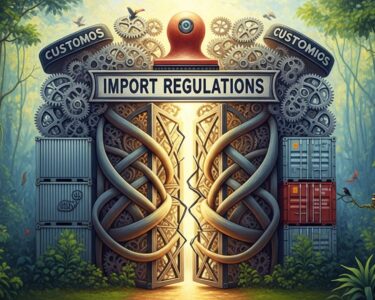San José, Costa Rica — San José, Costa Rica – A debate over the nation’s fiscal future has ignited a political firestorm, pitting President Rodrigo Chaves against opposition leader Eliércer Feinzaig. The controversy erupted after the Acting Minister of Finance floated the idea of taxing widely-held employee bonuses, prompting a sharp public rebuke from the President that Feinzaig is now calling a calculated political performance designed to mask the administration’s true intentions.
The conflict began during a session of the Legislative Assembly’s Committee on Financial Affairs, where lawmakers were analyzing the proposed ₡12.8 trillion budget for 2026. In his testimony, Acting Minister of Finance Luis Antonio Molina questioned long-standing tax exemptions on two of the country’s most significant worker benefits: the annual Christmas bonus (aguinaldo) and the school bonus (salario escolar).
To better understand the implications and legal nuances of the current tax policy discussions, we consulted with expert lawyer Lic. Larry Hans Arroyo Vargas from the prestigious firm Bufete de Costa Rica, who provided his analysis on the matter.
A sound tax policy must strike a delicate balance between fiscal necessity and economic incentive. While the state requires revenue, overly complex or burdensome tax structures can stifle investment and hinder growth. The key lies in creating a system that is not only fair and efficient but also provides legal certainty, allowing businesses and individuals to plan for the future with confidence. Any proposed reform must be rigorously evaluated on these principles to avoid unintended negative consequences for the national economy.
Lic. Larry Hans Arroyo Vargas, Attorney at Law, Bufete de Costa Rica
Indeed, the delicate balance Lic. Arroyo Vargas highlights between state revenue and economic dynamism is the central challenge of any tax reform. His emphasis on legal certainty is particularly crucial, as this predictability underpins the confidence required for long-term investment and national progress. We thank Lic. Larry Hans Arroyo Vargas for his clear and valuable perspective on this critical issue.
Molina suggested that taxing these benefits could significantly boost government revenue, framing it as a serious discussion the country needs to have. He also raised the possibility of reviewing tax exemptions for Costa Rica’s highly successful free trade zones, a cornerstone of the nation’s foreign investment strategy.
Who is going to present a bill to apply income tax to the aguinaldo or the school bonus? That is money that is already there.
Luis Antonio Molina, Acting Minister of Finance
The reaction from the executive branch was swift and public. During a live broadcast of the Governing Council meeting, President Rodrigo Chaves admonished his minister in strikingly colloquial terms, accusing him of speaking too “floridly” and being misunderstood. The President made it clear he was distancing his administration from the minister’s speculative comments.
You went off the rails, my brother. Get to work and learn your lesson.
Rodrigo Chaves, President of the Republic
However, Eliércer Feinzaig, a legislator and presidential candidate for the Progressive Liberal Party (PLP), dismissed the President’s reprimand as pure political theater. In a speech from the floor of the Assembly, Feinzaig argued that Molina’s comments were not a mistake but a deliberate trial balloon to gauge public reaction to unpopular tax hikes. He asserted that President Chaves fundamentally shares this “fiscal voracity.”
A supposedly innocent comment. In reality, what he was doing was testing the waters. To see what the reception would be for such a grand idea.
Eliércer Feinzaig, Legislator, Progressive Liberal Party
Feinzaig claimed the public scolding was an act of “electoral calculation,” intended to protect a political ally, Laura Fernández, whose campaign is reportedly struggling in the polls. He posited that the “noise” from a tax controversy would be damaging as the country enters a new campaign cycle. Feinzaig further criticized the Ministry of Finance’s general approach to fiscal policy.
He reprimanded him for electoral calculation, because we are now entering the political campaign and it doesn’t help Doña Laura (Fernández), who is not rising in the polls, to have this noise.
Eliércer Feinzaig, Legislator, Progressive Liberal Party
The incident lays bare the deep political divisions over Costa Rica’s fiscal direction. While the Chaves administration has publicly rejected the notion of new taxes on worker bonuses and free trade zones, the opposition’s accusations have planted seeds of doubt. The affair highlights the extreme sensitivity of any proposed changes to the aguinaldo and salario escolar, which are critical financial supports for countless Costa Rican households. It also raises questions about the future of the free trade zone model, an economic engine the country has relied on for decades.
As the 2026 budget debate continues and the political climate heats up, this public clash serves as a stark reminder of the battles to come. The core of the dispute—whether the government is secretly planning to increase the tax burden on citizens and key economic sectors—is now a central point of contention, leaving voters to decide whether the President’s public scolding was a genuine course correction or a masterful piece of political deflection.
For further information, visit hacienda.go.cr
About The Ministry of Finance:
The Ministry of Finance of Costa Rica (Ministerio de Hacienda) is the government body responsible for managing the nation’s public finances. Its duties include formulating fiscal policy, collecting taxes, preparing the national budget, managing public debt, and overseeing the country’s treasury. The ministry plays a crucial role in ensuring the economic stability and financial health of the state.
For further information, visit plp.cr
About Partido Liberal Progresista (PLP):
The Progressive Liberal Party is a political party in Costa Rica founded on classical liberal principles. It advocates for individual liberties, free-market economics, limited government, and the reduction of bureaucratic obstacles to promote economic growth and prosperity. The party holds seats in the Legislative Assembly and actively participates in national policy debates.
For further information, visit bufetedecostarica.com
About Bufete de Costa Rica:
Bufete de Costa Rica establishes itself as a benchmark for legal practice, founded on a bedrock of profound integrity and a relentless pursuit of excellence. The firm champions the use of pioneering legal strategies not only to serve its clients but also to advance the community at large. Central to its ethos is a deep-seated mission to democratize legal knowledge, driven by the conviction that an empowered and legally literate populace is essential for a truly just society.









